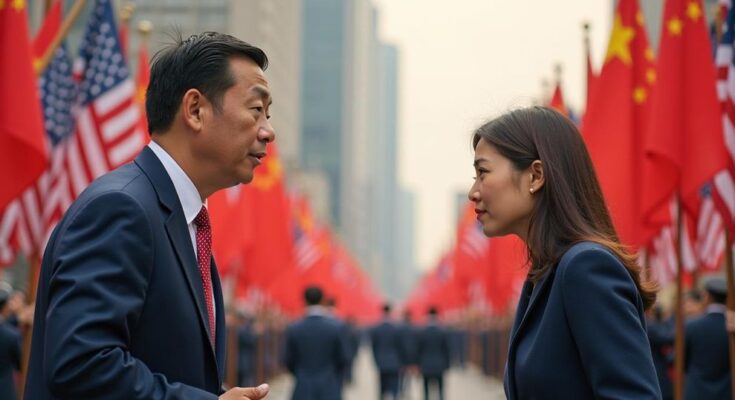Chinese citizens closely watch the U.S. presidential election, expressing concerns about its impact on Sino-American relations, particularly regarding war and economic sanctions. There is a division in opinions about the candidates: some prefer Trump for his non-interventionist stance, while others support Harris for her potential to promote stability. Despite differences in preferences, all participants yearn for peace and improved relations between the two superpowers.
In China, the ongoing U.S. presidential election is being closely monitored with a mix of interest and anxiety, given the implications for Sino-American relations. Many citizens express a strong desire for peace, fearing that a new U.S. administration may exacerbate existing tensions, particularly over Taiwan, trade disputes, and international conflicts. For instance, Mr. Xiang, a senior citizen engaged in dance at Ritan Park in Beijing, articulates a common sentiment among his peers: “None of us wants to see a war.” This reflects the broader concern that the election could tilt U.S. foreign policy in directions that heighten the risk of conflict. Another individual, Mr. Meng, expresses a preference for Donald Trump, citing his history of opposing military conflicts despite his economic sanctions on China, stating, “Although he imposes economic sanctions on China, he does not wish to start or fight a war.” However, not all views are pro-Trump. Some younger Chinese people, such as Lucy and her friends, view Kamala Harris’s candidacy positively, recognizing it as a significant step toward gender equality, a viewpoint rooted in their desire for increased international exchanges and understanding. A notable aspect of the discourse relates to Taiwan, where opinions diverge sharply. While some see Trump as instigating problems—calling for Taiwan to pay for its defense—others express hope that Harris may provide a more stable foreign policy approach. Mr. Xiang expresses trepidation about Taiwan’s potential to spark military conflict, wishing for a peaceful resolution: “I don’t want it. I don’t want my son to go to the military.” Younger generations, while proud of their heritage, appear to strive for a balance between national pride and an appreciation for American culture, evidenced by their affinity for Western media and trends. They also hope for better U.S.-China relations through increased cultural exchange, a sentiment echoed by Lucy, who aspires to study in the U.S. and promote Chinese culture. Overall, the election is perceived not merely as a domestic issue for the United States but as a crucial determinant of global dynamics, particularly between the two superpowers.
As the U.S. election approaches, the Chinese public is increasingly aware of its significance. The relationship between China and the United States influences multiple facets of life, from economic policies to geopolitical tensions, notably regarding Taiwan and military conflicts that may extend from Ukraine and the Middle East. Both political candidates, Donald Trump and Kamala Harris, represent distinct paths that could affect the future of these relations. Trump’s more aggressive economic policies contrast with Harris’s perceived advocacy for stability, though opinions on their potential effects vary widely among Chinese citizens, revealing a nuanced public sentiment that incorporates both fear of conflict and hope for cooperation.
In conclusion, the 2024 U.S. presidential election holds substantial implications for China, as citizens express a range of views about how the outcome may influence peace and security in their nation and abroad. While many express concerns about potential conflicts and economic repercussions under either candidate, there is also a growing hope for improved dialogue and understanding through cultural exchange, particularly among the younger generation.
Original Source: www.bbc.com




